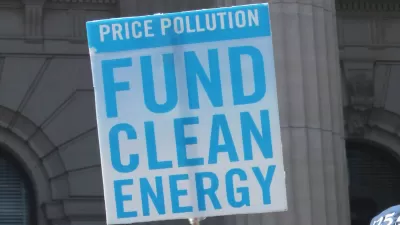In an unusual move that doesn't portend well for the EPA initiative, the Supreme Court ruled that the Clean Power Plan Rule that reduces emissions from existing power plants be suspended while it is heard by the Court of Appeals this summer.
In a 5-4 ruling, "Chief Justice John G. Roberts Jr. and Justices Antonin Scalia, Anthony M. Kennedy, Clarence Thomas and Samuel A. Alito Jr. [...] issued an unusual emergency order that blocks the Environmental Protection Agency from moving forward with its effort to reduce carbon pollution from [existing] power plants by 32% by 2030," writes Supreme Court reporter David G. Savage for the Los Angeles Times.
It is rare for the high court to intervene in a case pending in the lower courts. The brief order suggests that most of the justices have doubts about the legality of the EPA's policy.
A former Justice Department attorney [called it] a significant blow to the EPA and the administration’s climate change plan.
The Clean Power Plan rule was criticized by 29 states and state agencies who requested the stay, claiming that the plan was an overreach of the president's use of executive authority.
The order halting implementation of the Clean Power Plan rule "could also be a sign that conservative justices are increasingly skeptical of Obama’s use of executive authority," notes Savage. In a related article that deals with immigration, Savage writes that the Supreme Court will "render a verdict on his use of his executive authority."
“Make no mistake: This is a great victory for West Virginia,” said the state's attorney general, Patrick Morrisey in a press release.
“We are thrilled that the Supreme Court realized the rule’s immediate impact and froze its implementation, protecting workers and saving countless dollars as our fight against its legality continues.” West Virginia and Texas led the coalition of states challenging the EPA regulations.
The Sierra Club's press release was optimistic that the court would ultimately uphold the rule.
FULL STORY: Supreme Court deals blow to Obama by putting his climate change rules on hold

Study: Maui’s Plan to Convert Vacation Rentals to Long-Term Housing Could Cause Nearly $1 Billion Economic Loss
The plan would reduce visitor accommodation by 25,% resulting in 1,900 jobs lost.

Alabama: Trump Terminates Settlements for Black Communities Harmed By Raw Sewage
Trump deemed the landmark civil rights agreement “illegal DEI and environmental justice policy.”

Why Should We Subsidize Public Transportation?
Many public transit agencies face financial stress due to rising costs, declining fare revenue, and declining subsidies. Transit advocates must provide a strong business case for increasing public transit funding.

Paris Bike Boom Leads to Steep Drop in Air Pollution
The French city’s air quality has improved dramatically in the past 20 years, coinciding with a growth in cycling.

Why Housing Costs More to Build in California Than in Texas
Hard costs like labor and materials combined with ‘soft’ costs such as permitting make building in the San Francisco Bay Area almost three times as costly as in Texas cities.

San Diego County Sees a Rise in Urban Coyotes
San Diego County experiences a rise in urban coyotes, as sightings become prevalent throughout its urban neighbourhoods and surrounding areas.
Urban Design for Planners 1: Software Tools
This six-course series explores essential urban design concepts using open source software and equips planners with the tools they need to participate fully in the urban design process.
Planning for Universal Design
Learn the tools for implementing Universal Design in planning regulations.
Smith Gee Studio
Alamo Area Metropolitan Planning Organization
City of Santa Clarita
Institute for Housing and Urban Development Studies (IHS)
City of Grandview
Harvard GSD Executive Education
Toledo-Lucas County Plan Commissions
Salt Lake City
NYU Wagner Graduate School of Public Service



























